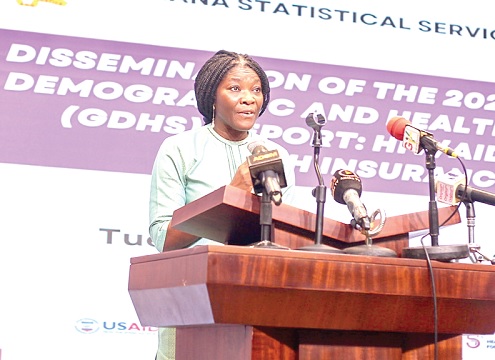Condom use among people with multiple sexual partners in the country is low, the 2022 Ghana Demographic and Health Survey (GDHS) has revealed.
The survey indicated that men, aged between 15 and 24 who had two or more sexual partners among those surveyed, were 24.7 per cent of those surveyed, while women within the same demographic bracket were 17.1 per cent.
Out of this sample, 28.2 of the men had sexual intercourse with a person who was neither their husband nor wife, neither did they live with them (non-cohabiting), while 13.1 per cent were women.
For the age bracket 15 to 49 years, 35 per cent of men had sex with a non-cohabiting partner who was not their wive, while 23 per cent of those interviewed were females.
For those among the bracket who used a condom during sex with a non-cohabiting partner, 11 per cent were females while 28 per cent were males.
The acting Director, Demography of the Ghana Statistical Service, Godwin Odei Gyebi, who made the findings known when he presented the second dissemination of the 2022 GDHS report on HIV/AIDS and health insurance in Accra last Tuesday, suggested that by the data, the way forward was extensive campaign on HIV and AIDS prevention if the country wanted to reduce HIV and other sexually transmitted infections.
Context
The survey covered 18,540 households distributed across all the 16 regions and 261 districts of the country.
The survey conducted interviews with 17,933 households, 15,014 women, aged 15 to 49, and 7,044 men, aged 15 to 59.
Furthermore, anthropometric measurements were taken for 4,935 children, aged 0-5, while children, aged 6-59 months, underwent malaria testing using both the Malaria Rapid Diagnostic Test (RDT) and microscopy.
The survey thus covered a broad spectrum, including household interviews, assessments of individual women’s reproductive choices and experiences, including attitude towards wife beating, sexual and men within specific age ranges, as well as health measurements and testing for children of different age groups.
The interviews sought answers that predated the survey by 12 months.
Mr Gyebi further provided data on men and women between 15 and 24 years, and 15 and 49 years who had two or more partners as well as those who had multiple sexual partners and higher risk sexual intercourse among persons aged 15 to 24 years.
For females 15 to 24 that had two or more partners in the last 12 months, they were three per cent as against 9.9 per cent for men.
Females 15 to 49 years who had two or more partners in the last 12 months were 2.2 per cent while the men were 14.9 per cent.
Medicines for HIV
Touching on knowledge of medicines to treat or prevent HIV, the Director, Demography, said the report showed that 65 per cent of women as against 62 men aged 15 to 49 years had heard that antiretrovirals could treat HIV, while 70 per cent of women as against 65 per cent men knew that the risk of mother-to-child transmission could be reduced by the mother taking special drugs, while 17 per cent of women as against 19 per cent of men have heard of pre-exposure prophylaxis.
On HIV testing among 15 to 49-year-olds, the report showed that whereas 54 per cent of women had ever tested for HIV and received the results, that of men was 24 per cent.
Other areas he touched on in the report were discriminatory attitudes towards people living with HIV, HIV testing during antenatal care and knowledge about HIV prevention among young people.
Making a presentation on health insurance, the Senior Manager, Research of the National Health Insurance Authority (NHIA), Mariam Musah, indicated that as of the time of collecting information for the report, the percentage of women and men aged 15 to 49 with health insurance coverage were 90 and 73 respectively.
She disclosed that the number of men and women on health insurance was increasing, however, more women between the ages of 15 and 49 years were covered by health insurance in relation to men.
The report
The Deputy Government Statistician, Dr Faustina Frempong-Ainguah, expressed the hope that the report would aid in shaping, implementing, monitoring and evaluating policies and programmes to enhance the overall population.
It would also help to specifically address reproductive issues of populations at risk of HIV and AIDS infection and attitudes towards persons living with HIV and AIDS.
The UNAIDS Ghana Country Director, Hector Sucilla Perez, congratulated the GSS, Ghana Health Service and the Ghana AIDS Commission for the decision to include an HIV-related chapter in the 2022 survey.
Source: graphic.com.gh

